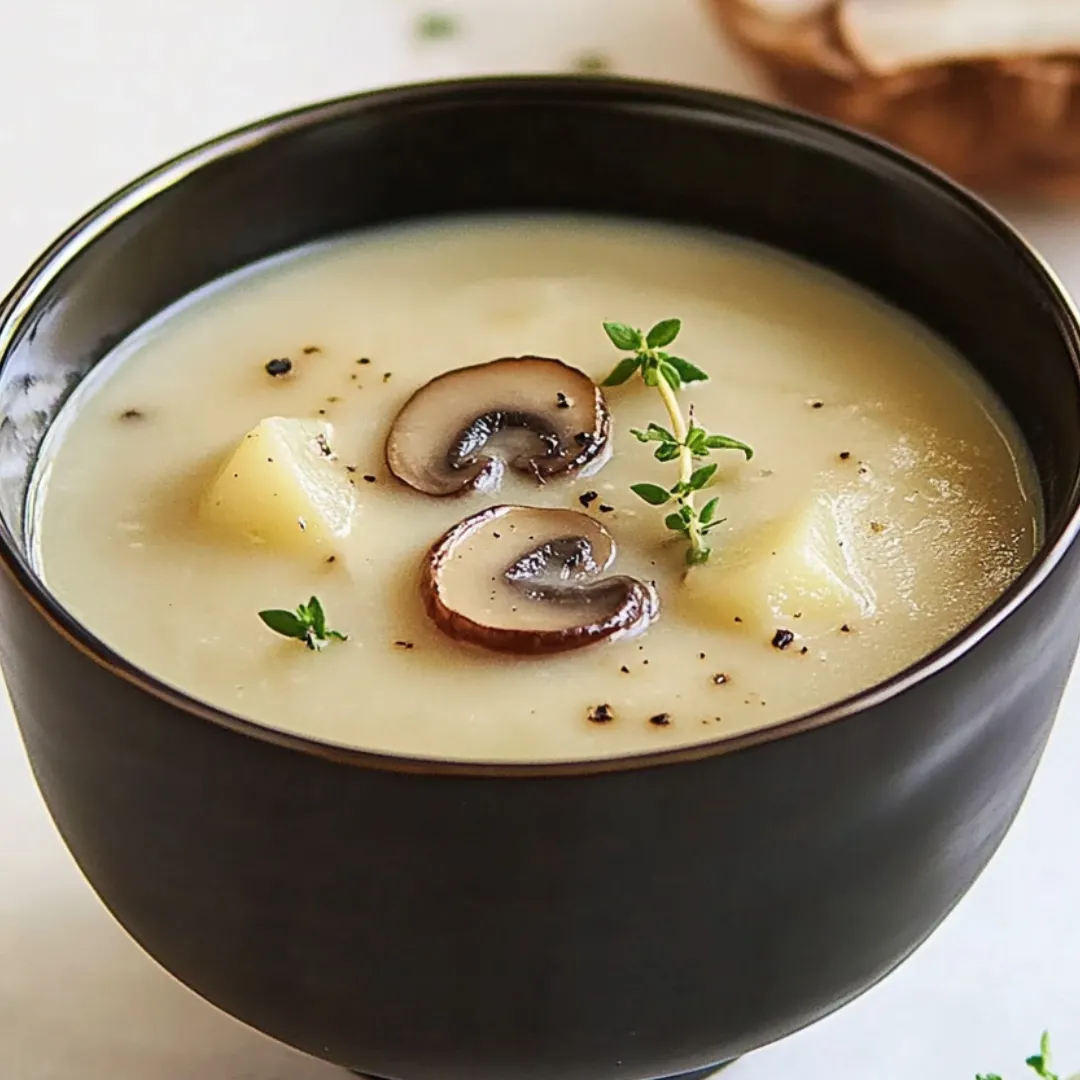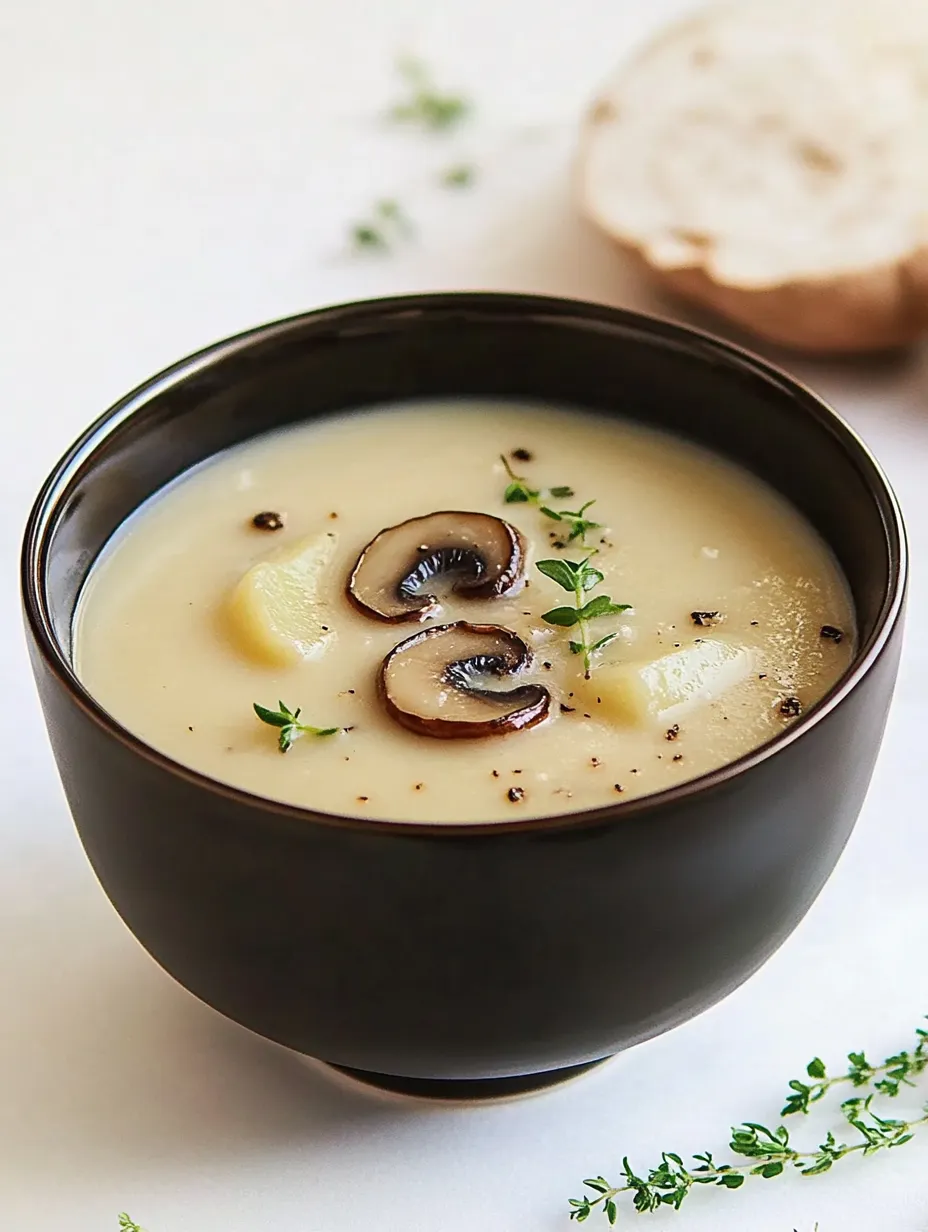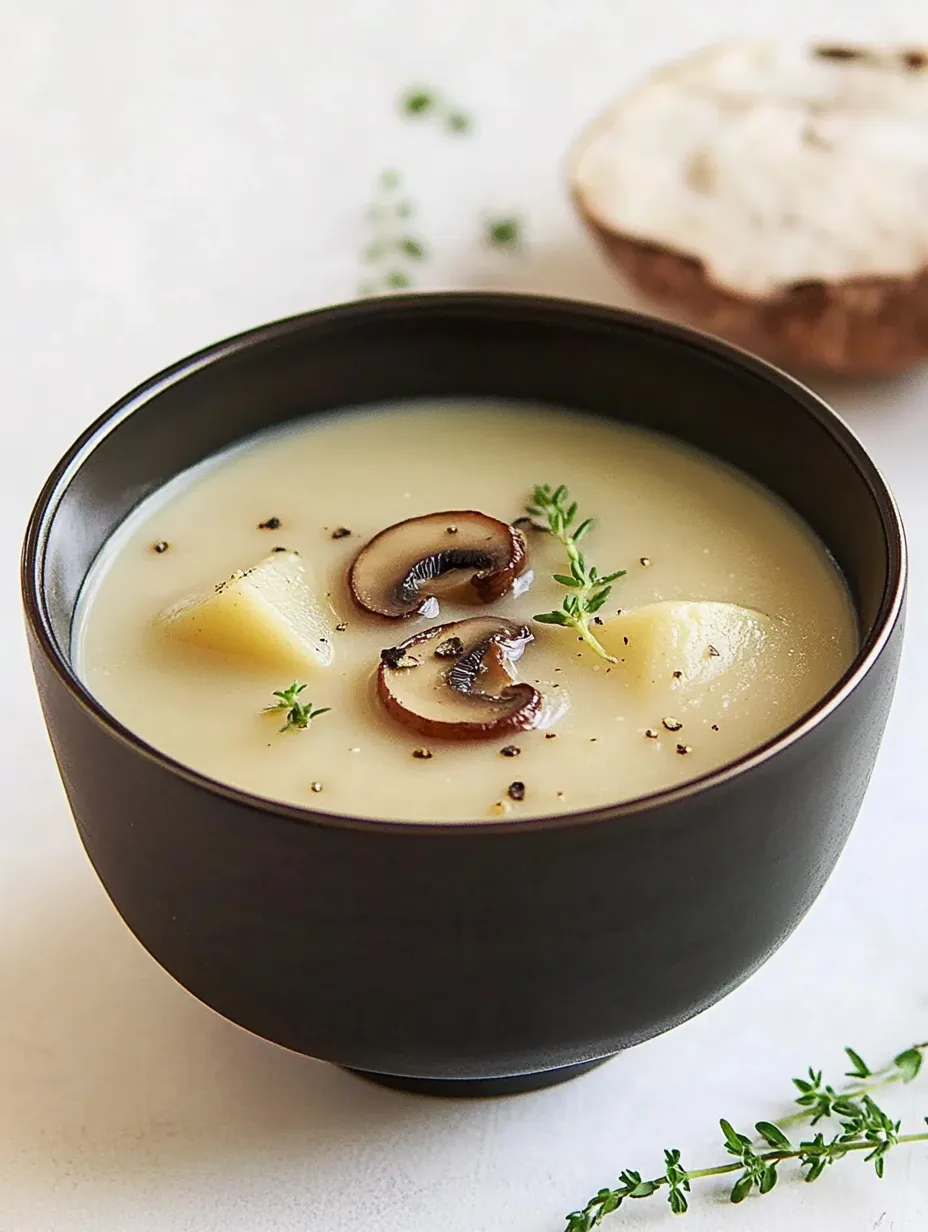 Pin it
Pin it
This silky potato soup combines buttery roasted garlic with velvety potatoes and umami-rich mushrooms for the ultimate comfort food experience. The elegant transformation of simple ingredients creates a sophisticated soup with remarkable depth and texture. A proper roux forms the foundation, turning ordinary broth into a silken masterpiece that cradles tender potatoes and sweet, caramelized garlic. Topped with perfectly seared mushrooms that provide textural contrast, this soup bridges the gap between rustic home cooking and refined culinary technique, making it perfect for both weeknight dinners and special occasions.
I first developed this soup recipe during a particularly cold winter when I was craving something substantial yet sophisticated. The transformation of garlic through roasting was a revelation I discovered in my late teens, but combining it with a classic béchamel technique created something truly special. When I served this soup at a small dinner gathering, my friend who typically skips soup courses took one spoonful and immediately asked, "What is in this?" The way the silky texture coated the palate, followed by the sweet notes of roasted garlic and the satisfying umami of seared mushrooms created such a memorable experience that it's now requested whenever anyone in my circle hosts a cold-weather gathering. Even my father, who claims to dislike "fancy food," requests this soup regularly, proving that comfort and elegance aren't mutually exclusive.
Essential Ingredients
- Russet potatoes: Their high starch content creates the perfect creamy texture when blended. Choose firm potatoes without green spots or sprouts for the cleanest flavor.
- Garlic heads: Select plump, firm heads with tight cloves and minimal sprouting. Larger cloves are easier to work with after roasting and provide more caramelized flavor.
- Crimini mushrooms: These brown mushrooms offer richer flavor than button mushrooms. Look for firm caps with tightly closed gills for the freshest taste and best texture.
- Butter: Creates the essential roux foundation and adds richness. European or cultured butter provides the most complex flavor if available.
- All-purpose flour: Works with butter to form the crucial roux that transforms the texture. Measure carefully for the perfect consistency.
- Vegetable or chicken broth: Forms the liquid base of the soup. Homemade provides the best flavor, but a good quality low-sodium store-bought version works well.
- Milk and half-and-half: The combination creates perfect richness without becoming too heavy. Use whole milk for the best flavor and texture.
- Thyme: Provides earthy, aromatic notes that complement both the potatoes and mushrooms. Fresh thyme sprigs make an elegant garnish.
- Sea salt and black pepper: Essential for proper seasoning throughout the cooking process. Freshly ground pepper makes a noticeable difference in the final flavor.
 Pin it
Pin it
Step-By-Step Preparation
- Step 1:
- Prepare the roasted garlic with attention to detail - Preheat your oven to 375°F (190°C). Take one or two whole heads of garlic and use a sharp knife to slice off the top quarter-inch, exposing the cloves within. Peel away as much of the papery outer layers as possible while keeping the head intact. Place the garlic on a square of aluminum foil, drizzle the exposed cloves generously with olive oil, and sprinkle with sea salt and freshly ground black pepper. Wrap the foil around the garlic to create a sealed package and place on a baking sheet. Roast for 40-45 minutes until the garlic becomes golden brown and butter-soft when pierced with a knife. The kitchen should fill with a sweet, mellow garlic aroma that lacks the sharpness of raw garlic. Allow to cool slightly before gently squeezing the bottom of the head to extract the soft, caramelized cloves.
- Step 2:
- Cook the potatoes properly - While the garlic roasts, peel 2 pounds of russet potatoes and cut them into uniform 1-inch chunks to ensure even cooking. Place in a large pot, cover with cold water (not hot, which can cause uneven cooking), add a teaspoon of salt, and bring to a gentle boil. Cook until the potatoes are just fork-tender, about 15 minutes—they should offer slight resistance but not be completely soft, as they'll continue cooking in the soup. Drain thoroughly and set aside. The potatoes should be cooked separately rather than directly in the soup base to prevent excessive starchiness and ensure perfect texture.
- Step 3:
- Create the silky béchamel base - In a large Dutch oven or heavy-bottomed pot, melt ¼ cup of butter over medium-low heat. Add one chopped yellow onion and sauté for 5-6 minutes until translucent but not browned. Sprinkle ¼ cup of flour over the buttered onions and whisk constantly for about 2 minutes to cook the flour without allowing it to brown. This roux is the critical foundation for the soup's luxurious texture. Gradually whisk in 4 cups of broth, followed by 1 cup of milk and ¼ cup of half-and-half, ensuring no lumps form. Add ½ teaspoon of ground thyme along with a few cracks of salt and pepper. Bring the mixture to a gentle boil, whisking constantly, then reduce to low heat and simmer for 2-3 minutes until noticeably thickened.
- Step 4:
- Blend to perfection - Add the cooked potatoes and extracted roasted garlic cloves to the béchamel sauce, stirring gently to combine. Remove from heat and allow to cool slightly for safer blending. Working in batches to avoid overflow, transfer the mixture to a blender or food processor. Secure the lid with a kitchen towel held firmly on top to prevent hot splatters, and blend each batch for 1-2 minutes until completely smooth with no remaining potato pieces. For a silkier consistency, pass the blended soup through a fine-mesh sieve back into the clean pot, pressing gently with a rubber spatula. Adjust the consistency with additional broth if needed, and taste for seasoning, adding more salt and pepper as necessary.
- Step 5:
- Sear the mushrooms with technique - The mushrooms should be prepared separately to develop their flavor and texture. Heat a heavy cast-iron skillet or non-stick pan over medium-high heat until quite hot. Add 1 tablespoon of butter or olive oil, then add 4 cups of sliced crimini mushrooms, being careful not to overcrowd the pan (work in batches if necessary). Allow the mushrooms to sit undisturbed for 2-3 minutes to develop a golden sear before stirring. Continue cooking for 5-7 minutes total until the mushrooms have released and then reabsorbed their moisture, becoming golden brown with crisp edges. Season with salt and pepper toward the end of cooking to prevent drawing out too much moisture too soon.
- Step 6:
- Combine with intention - Gently fold most of the seared mushrooms into the blended soup, reserving some of the most attractive pieces for garnish. Return the soup to low heat just to ensure it's properly warmed through before serving. The finished soup should have a silky, velvety texture that coats a spoon beautifully, with visible pieces of seared mushroom providing textural contrast and visual appeal.
- Step 7:
- Garnish thoughtfully - Ladle the hot soup into warmed bowls. Top each serving with a few reserved seared mushrooms, a small sprig of fresh thyme, a light sprinkle of freshly ground black pepper, and optionally a few thinly sliced chives or green onions for color contrast. For added richness, a small drizzle of high-quality olive oil or a few shavings of Parmesan cheese make excellent finishing touches. The garnishes should complement rather than overwhelm the soup's elegant simplicity.
The Magic of Roux-Based Soups
What truly elevates this potato soup beyond the ordinary is the béchamel foundation, a technique that transforms both flavor and texture. While potatoes naturally create a thick soup when blended, the addition of a proper roux (the cooked butter and flour mixture) introduces a velvety quality that can't be achieved through potatoes alone.
When flour particles are coated in fat and then heated, the starch granules expand and gelatinize when liquid is added, creating a uniform thickening effect throughout the soup rather than the sometimes grainy texture that can result from potatoes alone. This process, called gelatinization, gives the soup its characteristic silken mouthfeel that literally coats the tongue.
The roux also provides longevity to the soup's texture. Without it, potato soups can break or become watery when reheated, but the stabilizing effect of the cooked flour ensures the soup maintains its luxurious consistency even when made ahead and reheated. This makes it perfect for entertaining or meal preparation.
Beyond texture, the slight toasting of the flour in butter adds subtle nutty notes that complement the earthy potatoes and sweet roasted garlic, creating a more complex flavor profile than simple pureed potato soups. This depth of flavor is what makes each spoonful a complete sensory experience rather than merely a vehicle for the garnishes.
I've made this soup countless times, and I've learned that the quality of each element truly matters. My first attempt used pre-minced garlic in oil instead of roasting whole heads, and the difference was remarkable—none of the sweet, caramelized complexity that makes the soup special. Similarly, I once tried to save time by skipping the roux, thinking the potatoes would thicken the soup enough. While the soup was certainly thick, it lacked that luxurious, velvety quality that makes it worthy of special occasions. The proper technique creates something far greater than the sum of its parts, transforming humble ingredients into something that feels genuinely special.
When my mother-in-law, who considers herself quite the soup connoisseur, asked for the recipe after her first spoonful, I knew I'd crafted something worth sharing.
 Pin it
Pin it
Make It Your Own
While this soup is delicious as written, there are several variations you might consider depending on your preferences:
For a deeper mushroom flavor, reconstitute a small handful of dried porcini or shiitake mushrooms in hot water, then use the strained soaking liquid as part of your broth. Chop the rehydrated mushrooms finely and add them along with the fresh seared mushrooms.
To make this soup more substantial for a main course, consider adding crispy pancetta or bacon as a garnish. The salty, crispy elements provide wonderful textural contrast against the smooth soup.
For a vegetable-forward variation, add a parsnip or two along with the potatoes. Their natural sweetness complements the roasted garlic beautifully while adding nutritional value.
If you prefer a soup with more texture throughout, reserve about a quarter of the potato-garlic mixture before blending and roughly mash it, then stir it back into the blended soup for occasional potato chunks.
For special occasions, a drizzle of white truffle oil just before serving adds an extraordinary aromatic element that pairs perfectly with the mushrooms and roasted garlic.
My final thought on this soup is that it perfectly embodies the joy of transformation in cooking. Taking humble ingredients like potatoes, garlic, and mushrooms and elevating them through careful technique creates something truly special that belies its simple origins. There's something deeply satisfying about serving a soup that makes people pause after the first spoonful, trying to identify just what makes it so exceptional. It's not fancy ingredients or complicated methods—it's attention to detail and respect for the process. This soup has become something of a signature dish in my home, the kind of recipe that creates memories and becomes part of your culinary identity. I hope it brings the same joy to your table as it has to mine.
Frequently Asked Questions
- → Can I make this soup gluten-free?
- Yes, substitute the all-purpose flour with tapioca starch or flour. While there may be a slight difference in smoothness, it works perfectly well for thickening the soup.
- → What's the best way to clean mushrooms?
- Don't rinse or soak mushrooms as they're about 90% water and will become soggy. Instead, use a brush or slightly damp cloth to clean them.
- → Can I freeze this soup?
- Yes, though dairy soups tend to separate when frozen. When reheating, whisk vigorously as it heats to avoid graininess, or add a little cornstarch slurry to help reconstitute the texture.
- → Can I use other types of mushrooms?
- Absolutely! While crimini mushrooms are used in this recipe, any variety will work. Oyster mushrooms, for example, have a delicious chewy texture that works wonderfully in soup.
- → What can I do with extra roasted garlic?
- Roasted garlic stores well in the fridge and has many uses: spread it on bread/crackers, add to dips/hummus, use in salad dressings, spread in sandwiches, or even on burgers.
